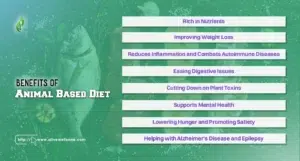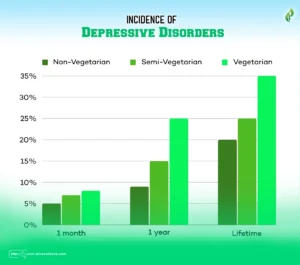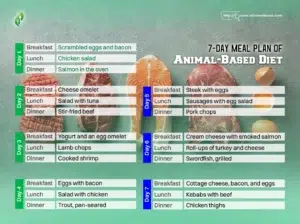Last Updated on November 8, 2024 by Helena Akter
Are you on the lookout for a diet that helps you keep a healthy weight and fills your diet with vital nutrients? An animal based diet could be just what you need. It centers on animal products and offers many health benefits that you might not get from plants alone.
Besides, you should know how valuable it is to add foods rich in nutrients from animals to your diet. These aren’t just full of vitamins and minerals; they also give you the high-quality protein necessary for your body to work well.
Today, you’ll see how switching to a diet focused on animal products can improve your health, help you manage your weight, and lessen inflammation. We’ll walk you through the basics of this diet, helping you make choices that are good for your health.
What is an Animal Based Diet?
An animal-based diet includes meat, seafood, organ meats, and selectively includes fruits, honey, and squashes. It draws inspiration from pre-agricultural eating habits, combining aspects of primal and carnivore diets with a focus on nutrient-dense foods.
This way of eating is becoming popular for its emphasis on animal products full of nutrients, especially organ meats. It looks back to the diets of our ancestors who hunted and gathered their food, incorporating both meat-heavy and some plant-based foods.
This approach updates traditional dietary habits for today, with a special emphasis on the nutrient-packed organ meats that were highly valued by early humans.
Animal Based Diet Food List
Here are the foods that you’ll see in an animal based diet food list
- Organ meats: Livers, brains, hearts, and intestines
- Red meat: Beef, lamb
- Fish: Alaskan salmon, herring, cod, mahi-mahi, trout, mackerel, sardines
- Poultry: Chicken, turkey, duck, quail, geese, and pheasants
- Sauce or gravy: Made from meat and butter, no flour allowed
- Lard
- Eggs
- Butter
- Bone marrow
- Bone broth
- Salt and pepper
- Water
Benefits of Animal Based Diet

Adopting an animal-based diet brings us back to eating the nutrient-rich foods our bodies were originally designed to consume, offering several advantages —
Rich in Nutrients
Foods in an animal-based diet pack a more potent nutrient punch, both in the variety and amount of nutrients they provide and in how easily our bodies can absorb these nutrients. This advantage is often referred to as “meat efficiency.”
Contrary to the widespread belief in the necessity of a “balanced diet” that includes plants, it turns out that animal products such as meat, eggs, and full-fat dairy are nutritionally superior. These foods offer much more than just fat and protein, debunking the common misconception that they are limited in nutritional value.
Improving Weight Loss
Switching to an animal-based diet can help you lose weight by cutting down on carbs and focusing on healthy fats and proteins. In fact, losing weight brings several health benefits, such as reducing inflammation in conditions like arthritis. This happens because of the positive changes in your body’s mechanics and chemistry.
A study in 2022 found that combining a low-carb diet with omega-3 supplements can significantly reduce body fat in people who are overweight. Moreover, if you’re concerned about your weight, try the fat burning foods for weight loss.

Reduces Inflammation and Combats Autoimmune Diseases
An animal-based diet gets rid of processed foods, which are a big part of the unhealthy Standard American Diet. Processed foods, along with sugars, vegetable oils, and grains, are known to cause chronic inflammation. This inflammation is at the heart of many modern illnesses, including
- Heart disease
- Type 2 diabetes
- High blood pressure
- Dementia
- Certain types of cancer
- Autoimmune diseases
Autoimmune conditions can range from digestive disorders and osteoporosis to infertility. By avoiding these inflammatory foods, an animal-based diet can help protect against these health issues.

Easing Digestive Issues
Switching to an animal-based diet can help solve digestive problems. This diet cuts out foods high in FODMAPs and plant compounds like lectins, oxalates, and phytates, which can harm your gut lining and lead to leaky gut. Instead, animal-based foods are rich in vitamins A and D.
These vitamins are good for your gut bacteria and can help prevent inflammatory bowel diseases and leaky gut. Not getting enough vitamin D can weaken your gut’s defenses, making issues like inflammatory bowel disease more likely.
By eating foods like fatty meats and organ meats, you get plenty of vitamins that dissolve in fat, which can fix these deficiencies. Foods such as eggs and beef are also great sources of glutamine, an amino acid that helps maintain the barrier in your intestines. It keeps harmful substances from getting into your bloodstream.
Cutting Down on Plant Toxins
An animal-based diet greatly reduces or even gets rid of your body’s exposure to many plant toxins and anti-nutrients. These include phytic acid, which blocks your body from absorbing important vitamins and minerals.
Long-term exposure to plant toxins like oxalates, histamines, and others, along with anti-nutrients such as lectins, can lead to allergies, leaky gut, autoimmune diseases, and ongoing inflammation.
Supports Mental Health
Research shows that eating meat and animal products can help protect against mental health problems like depression and anxiety. In 2021, two comprehensive reviews of studies involving nearly 600,000 people found that vegetarians often reported higher levels of depression and anxiety compared to those who eat meat.

Lowering Hunger and Promoting Satiety
A study in 2022 involving 17 men compared the effects of high-protein diets with periods of high and moderate carbohydrate intake. During the phase with lower carbs, participants reported feeling significantly less hungry.
Another study in 2008 discovered that diets high in protein but low in carbs, known as ketogenic diets, were more effective at reducing hunger than diets with moderate carbs.
Animal-based diets, which are rich in protein, help you feel fuller for longer. They can also lower the levels of ghrelin, the hormone that makes you feel hungry. This means you might eat less and potentially lose weight.
A 2019 study found that a ketogenic diet could increase muscle mass while reducing inflammation and oxidative stress by making you feel more satisfied and less hungry, especially in people with MS.
Helping with Alzheimer’s Disease and Epilepsy
Research from 2018 shows that diets high in animal products and low in carbs, known as ketogenic diets, can boost the health of your cells’ powerhouses and lower oxidative stress. It can help fight inflammation, which is beneficial for people with Alzheimer’s disease and epilepsy.
These diets are known to enhance brain function and overall quality of life for those with Alzheimer’s. A study in 2021 found that cutting down on carbs can improve various memory functions in people with Alzheimer’s, mild to severe, or moderate to severe cognitive problems.

Moreover, research from 2022 discovered that ketogenic diets could slow down the worsening of Alzheimer’s symptoms. Ultimately helping to protect against the negative effects of the disease on the brain.
7-Day Meal Plan of Animal-Based Diet
Check out this simple 7-day meal plan for an animal-based diet. Feel free to adjust it to fit your needs, keeping in mind to stick to foods that are part of the diet.
Day 1
- Breakfast: Scrambled eggs and bacon
- Lunch: Chicken salad
- Dinner: Salmon in the oven
Day 2
- Breakfast: Cheese omelet
- Lunch: Salad with tuna
- Dinner: Stir-fried beef
Day 3
- Breakfast: Yogurt and an egg omelet
- Lunch: Lamb chops
- Dinner: Cooked shrimp
Day 4
- Breakfast: Eggs with bacon
- Lunch: Salad with chicken
- Dinner: Trout, pan-seared
Day 5
- Breakfast: Steak with eggs
- Lunch: Sausages with egg salad
- Dinner: Pork chops
Day 6
- Breakfast: Cream cheese with smoked salmon
- Lunch: Roll-ups of turkey and cheese
- Dinner: Swordfish, grilled
Day 7
- Breakfast: Cottage cheese, bacon, and eggs
- Lunch: Kebabs with beef
- Dinner: Chicken thighs
How to Eat an Animal-Based Diet at Restaurants
Choose meat or seafood dishes and opt for sides like fruit, white rice, sweet potatoes, or zucchini. Request meals to be cooked in butter instead of seed oils and look for restaurants that avoid using seed oils.
Now, eating out doesn’t have to be hard when you’re on an animal based diet. You don’t need to give up enjoying meals out with friends or family. Here’s how to stick to your diet —
- Choose Meat or Seafood: Start with a dish centered around meat or seafood, which most restaurants offer.
- Pick the Right Sides: Look for sides that fit your diet, such as fruit, white rice, sweet potatoes, or squash.
- Avoid Seed Oils: Since many places cook with seed oils, ask if they can use butter instead. Some websites even list restaurants that cook without seed oils.
- Know Where to Go: BBQ places, steakhouses, and sushi spots are great because they usually have many animal-based options.
Is the Animal-Based Diet Healthy?
The health benefits of an animal-based diet vary by individual, depending on personal health, dietary choices, and lifestyle balance. Consulting a healthcare professional is recommended before making significant dietary changes.
You must know your health condition, as this diet may not suit everyone, especially those with specific health issues. The quality and variety of animal products consumed play a significant role in the diet’s impact on your health.
Before making any significant changes to your diet, consulting with a healthcare professional is advisable to ensure it aligns with your health needs and goals. Moreover, research and thoughtful consideration are key to deciding if this diet is the right choice for you.
The Side Effects of the Animal-Based Diet
When you start an animal-based diet, you might notice some changes in your body as it adjusts to your new way of eating. These changes are usually temporary and tend to disappear after a few days. Here’s what you might experience —
- Cholesterol Levels: There might be concerns about cholesterol due to eating only animal products.
- Digestive Changes: You could have digestive issues like diarrhea or constipation as your body gets used to the diet.
- Headaches and Nausea: Some people report feeling headaches or nausea in the beginning.
- Food Cravings: You may find yourself missing foods that aren’t part of an animal-based diet. Here, knowing how to create healthy food cravings can save you from this side effect.
It’s important to weigh these potential side effects against the benefits to decide if an animal-based diet is right for you.
What Foods Are Excluded in an Animal-Based Diet, and Why?
An animal-based diet focuses on natural, unprocessed foods. It’s about choosing foods that nourish your body without causing inflammation. Let’s look at what foods you’ll be skipping and why they’re not part of this diet.
- Processed Foods: Skip anything that’s been significantly altered from its original form.
- Oils Rich in Omega-6: Avoid oils like sunflower, canola, corn, and soy.
- Certain Oils: Be cautious with olive oil due to potential mixing with seed oils.
- Grains: These are not included in the diet.
- Processed Sugars: Stay away from all forms of processed sugars and artificial sweeteners.
- Vegetables and Legumes: Yes, these are excluded too.
- Seeds: Generally, seeds are not eaten.
Why These Foods Are Excluded
Here are the reasons for excluding them from animal based diets.
- Processed Foods and Sugars: They can cause inflammation, lack essential nutrients, and lead to unstable blood sugar levels.
- Oils High in Omega-6: These oils are avoided in favor of healthier fats that support your body without promoting inflammation.
- Grains: Due to their processing and nutrient-stripping, grains can irritate your gut and offer little nutritional value.
- Vegetables and Legumes: These plants contain natural chemicals to protect themselves, which can be harmful if consumed in large quantities.
- Seeds: Like some vegetables, seeds are designed to survive digestion and therefore don’t offer much nutritionally.
Who Can Follow the Animal-Based Diet?
If you’re wondering whether an animal-based diet is right for you, here’s who might benefit —
Generally Healthy People: If you don’t have any health issues or dietary limits, you might want to give this diet a try.
Athletes: Since animal products are packed with protein, athletes or anyone needing more protein might find this diet helpful.
People with Inflammation: If you’re dealing with inflammation, this diet could help reduce it, but it’s best to do this with a doctor’s guidance.
Those Looking to Manage Weight: If you’re trying to control your weight or lose some, the filling nature of animal-based foods can be beneficial.
Who Should Avoid the Animal-Based Diet?
Not everyone should jump into an animal-based diet without some thought —
Individuals with High Cholesterol: If your cholesterol is already high, you might need to be cautious about the cholesterol in animal foods.
People with Heart Issues: If you have heart problems, the saturated fat in animal products is something you’ll need to watch. In that case, opt for heart healthy foods.
Vegetarians and Vegans: Obviously, if you’re committed to a plant-based lifestyle, this diet would be a significant shift unless you’re considering changing your diet.
Lifestyle Considerations

Eating like our ancestral diet is just one part of achieving optimal health. It’s also crucial to adopt a lifestyle similar to theirs as much as possible. Here are some key practices to incorporate into your daily life for better animal based diet results —
1. Sleep and Recovery
Sleep is a must for healing, recovering, and building muscle. So, make sure you’re eating enough connective tissue and bone broth. Glycine, found in these foods, works as a neurotransmitter in your brain, helping you relax and enjoy deep sleep.
2. Sunlight
Make time to go outside, soak up some sun, and connect with nature. Sunlight does more than just boost your mood. It helps your body make nitric oxide and Vitamin D, which can balance your hormones, lower blood pressure, and improve blood circulation.
Regular sun exposure also helps set your body’s natural sleep-wake cycle, supporting sleep, muscle growth, recovery, and even weight loss. Plus, getting enough sunlight can improve the variety of good bacteria in your gut.
3. Exercise and Movement
For top-notch health, moving your body every day is key. A simple goal to start with is taking two or three 15-minute walks around meal times. This helps keep your blood sugar levels in check. And if you’re up for it, adding some weight training into the mix is a great way to build strength!
4. Stress Management
It’s normal to feel stressed from time to time. But for your body to heal and stay healthy, managing that stress is crucial. We encourage everyone to find a stress-relief activity that works for them. Whether it’s meditation, prayer, enjoying time outside, gardening, or picking up a new hobby, these are all great ways to unwind and take care of your mental health.
Conclusion
Switching to an animal based diet can bring you a lot of health benefits. You’ll get more nutrients, lose weight more easily, experience less inflammation, and even see improvements in your mental health.
By choosing more animal products and fewer plant-based foods, you aim to avoid plant toxins and make digestion smoother. This way of eating is especially good if you’re fighting autoimmune diseases, want better digestion, or need a mental health boost.
Plus, it makes you feel full longer, which can help with Alzheimer’s disease and epilepsy. But remember, getting enough sleep, enjoying sunlight, staying active, and managing stress are also key to getting the most out of this diet. It’s not for everyone, but if it fits your lifestyle, you might see a big improvement in your health.
FAQs
What is the Carnivore Diet?
The Carnivore Diet focuses mainly on eating animal products like meat, eggs, and organs, with very few or no carbs. Some people on this diet might still consume small amounts of carbs through dairy products like milk or cheese.
It’s sometimes recommended to follow this diet strictly for about 30 days, with medical guidance, for specific health benefits.
Can I lose weight on an animal-based diet?
Yes, many people successfully lose weight on an animal-based diet. However, weight loss involves various factors, including how well your thyroid is working. If your thyroid function is low, it might make losing weight more challenging, so addressing any thyroid or other health issues is crucial.
Is animal-based the same as carnivore diet?
No, they’re not the same. While all foods in the carnivore diet are animal-based, the animal-based diet is broader and can include other foods. You might eat mostly meat but also add some fruits and honey, depending on your preference.
In fact, the animal-based diet offers a range of options, from heavy meat consumption to including more plant-derived foods like fruits and honey.


